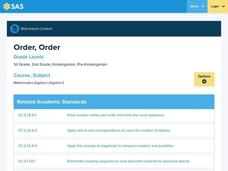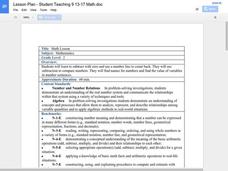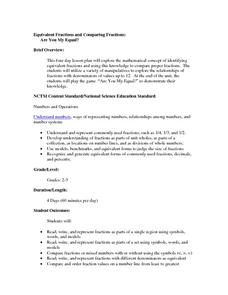Curated OER
Comparing and Ordering
Before handing out this number comparison activity, ask scholars to pick a number between 20 and 50. Could they do it? Explain that they chose a number greater than 20 and less than 50, which is exactly what they will be doing next. Each...
Curated OER
Jump Rope Math
Students practice grade level math skills. In this math lesson, students solve math facts on index cards and collaboratively arrange them in numerical order on a jump rope. Correct order earns the team a chance to physically move towards...
Illustrative Mathematics
Field Day Scarcity
Introduce young mathematicians to concepts of financial literacy with this open-ended word problem. With seven dollars to spend during field day and given a list of available items and their prices, children must determine how they want...
Curated OER
Free Printables: Number Cards
In this number sequences worksheet, student cut out the number cards on the worksheet. The number cards can be used for many purposes, including arranging them in a specific number sequence. Teachers can use the worksheet generator to...
Curated OER
Study Buddies: Comparing and Ordering Decimals
In this math worksheet, students will work with a coach to compare and order numbers with decimals to the hundredths place. Students will follow a step-by-step process and notes are provided for the coach.
Curated OER
Number Books
Pupils construct a book to illustrate number concepts. They write their numbers on a sheet of paper. Students in grade 1 discuss counting to 100 by different numbers. Pupils in grades (2-4) write basic addition or subtraction story...
Pennsylvania Department of Education
Order, Order
Students use pictures to identify items as ordinal numbers. In this ordinal numbers lesson plan, students use the words "before" and "after" to identify the pictures as well.
Curated OER
Missing Number Bingo
Students practice counting forwards and backwards with decimal numbers. They participate in a class or small group bingo game from the advanced additive and advanced multiplicative stages six and seven. Each student can choose to either...
Curated OER
Ordering Fractions and Decimals
Students place fractions and decimals with unlike values in correct numerical order.
Curated OER
Who's In The Fact Family?
Learners study related addition and subtraction facts. In this math lesson, students use related addition and subtraction to solve problems. Learners use manipulatives to explore fact families.
Curated OER
George's Place
Here is another in the interesting series of lessons that uses money as a learning tool. This one is especially clever! During the lesson, pupils pretend they are eating at "George's Place" diner. Small groups are given one bag of play...
Curated OER
Number Line Math
Second graders use a number line to practice subtraction. In this subtraction lesson, 2nd graders use a number line to count backwards. Students participate in mad math activities and solve problems.
Curated OER
Finding Addition Patterns
Pupils practice finding the sums of two-one digit numbers. In this addition lesson plan, students also record facts onto an addition chart.
Curated OER
Decimal Fractions
Students use rounding and compensating with whole numbers and explain how to use the empty number line to show additions and subtractions. They round and compensate in relation to decimal subtraction
Background
Pennsylvania Department of Education
Freckle Face
Students collect and record data. In this early data analysis lesson, students gather data about their partners face. As a class, the students use tally marks and pictographs to record the data and answer question about the information...
Curated OER
Equivalent Fractions and Comparing Fractions
How can you tell if fractions have equal value? Use various collaborative activities to demonstrate the ways to determine whether or not fractions are equivalent.
Curated OER
Fractions: Mud Pie Math
Second graders identify and name fractional parts through the use of mud pie manipulatives. In this fractional manipulatives lesson, 2nd graders identify and label halves, thirds, fourths, sixths, eighths, and tenths and order them...
Curated OER
Finding Sums to 6
Students explore the additive identity property where they add multiple numbers to get to the number 6. In this number 6 lesson plan, students also work on their addition charts.
Curated OER
Who Has More?
Students engage in a lesson plan that is concerned with the standard of comparing the quantities of whole numbers using different strategies from the concrete to the abstract. They count objects and compare them, use symbols of...
Curated OER
Calculate the Answer
Young scholars solve basic multiplication or addition facts using a calculator and product cards. They draw a card, read the sum or product, and press single digits on the calculator to display the number on the card.
Pennsylvania Department of Education
Seeing Doubles
Students work with dominoes to recognize the number of spots on each side as they relate to addition facts. In this seeing doubles lesson, students make triangle shaped flash cards for the double facts. Students represent the correct...
Curated OER
Graphing With Second Graders
Second graders sort M & M's and then enter the data into a spreadsheet in order to create a simple graph. After printing the spreadsheet generated graph, have students compare the printed graph with their paper graph.
Curated OER
Making Rectangles
Pupils study rectangles. For this math lesson, students use numbers, measurements and geometry to draw rectangles of varying sizes.
Math Slice
Math Slice: Ordering Game
Sequencing skills are the focus of this interactive game. You must be able to put fractions, decimals, whole numbers, and negative numbers in correct order to win and make the train move down the tracks. Immediate feedback given to...

























